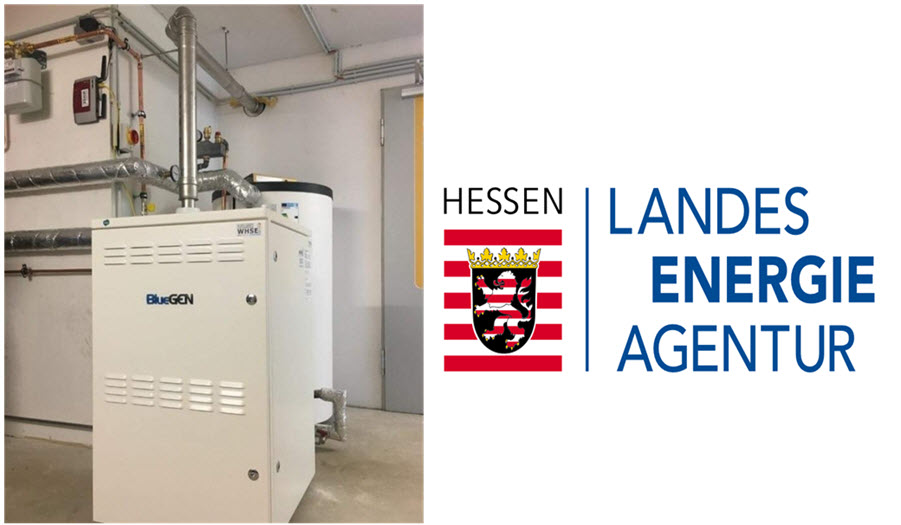
- Combined heat and power plant in Trebur: efficient, clean and quiet
A fuel cell micro combined heat and power unit (BZ micro CHP) has been supplying a Hessian primary school in Trebur-Astheim (Groß-Gerau district) with electricity and heat for more than six months. The system has thus successfully passed the first practical test. Since commissioning, over 6,000-kilowatt hours of electricity and around 2,500-kilowatt hours of heat have been generated.
In the primary school in Trebur-Astheim, the electricity generated is mainly used for personal use and the heat generated is used for heating the building. Excess electricity is fed into the public grid. The BlueGen model from the manufacturer SOLIDpower has an output of 0.6 kW thermal and 1.5 kW electrical.
Fuel cell CHPs are combined heat and power plants (CHP plants) and convert natural gas into electricity and heat with the help of the fuel cell. Compared to classic motor systems, fuel cells generally have a significantly higher electrical efficiency of up to 60 percent. This means that significantly more usable energy in the form of electricity and heat can be obtained from the same amount of natural gas, which can result in energy costs that are up to 40 percent lower. At the same time, there are up to 40 percent less CO2 emissions.
Fuel cell micro-CHP systems can reduce the CO2 footprint of buildings – both for single or multi-family houses as well as for commercial or communal units – by an average of more than one ton. For comparison: The average CO2 footprint per inhabitant in Germany is around twelve tons per year. In the long term, the already reduced CO2 emissions can even be completely avoided by switching to green hydrogen.
Hessen has been supporting fuel cell CHP plants for many years, which are an important building block for the success of the energy and heating transition. The LandesEnergieAgentur Hessen GmbH (LEA) is continuing the information and advisory campaign launched on behalf of the Hessian Ministry of Economic Affairs in 2020 to support the market ramp-up of innovative fuel cell technology.
Jürgen Schmidt, managing director of ETech and ÜWG and deputy chairman of the Hydrogen and Fuel Cell Initiative Hessen eV is pleased with the positive results of the practical test: “The first six months have shown that the technology works reliably and without problems. Since fuel cell, CHP plants produce electricity and heat in a more environmentally friendly way than conventional CHP plants and work absolutely quietly and vibration-free, these devices are extremely attractive for our customers. We, therefore, plan to start further projects with fuel cell BHWKs in the future. ”
Both private and commercial users and municipalities can apply for investment grants for the installation of innovative fuel cell systems in residential and non-residential buildings. To this end, KfW launched program 433 “Energy-efficient construction and renovation – fuel cell subsidy” on behalf of the federal government. The amount of the grant, depending on the electrical output, is between 7,050 and 28,200 euros.
The “BlueGen” model from manufacturer SOLIDpower GmbH was installed in July 2019 by EnergieTechnik Rhein-Main GmbH (ETech). ETech is a joint company of the Überlandwerk Groß-Gerau GmbH (ÜWG), which was responsible for the project development, the Riedwerke special-purpose association, and the Groß-Gerau district. KfW-Bank and the Mainz Foundation for Climate Protection and Energy Efficiency have funded the installation of the energy-efficient fuel cell CHP unit with a total of around 12,000 euros.
Read the most up to date Fuel Cell and Hydrogen Industry news at FuelCellsWorks




